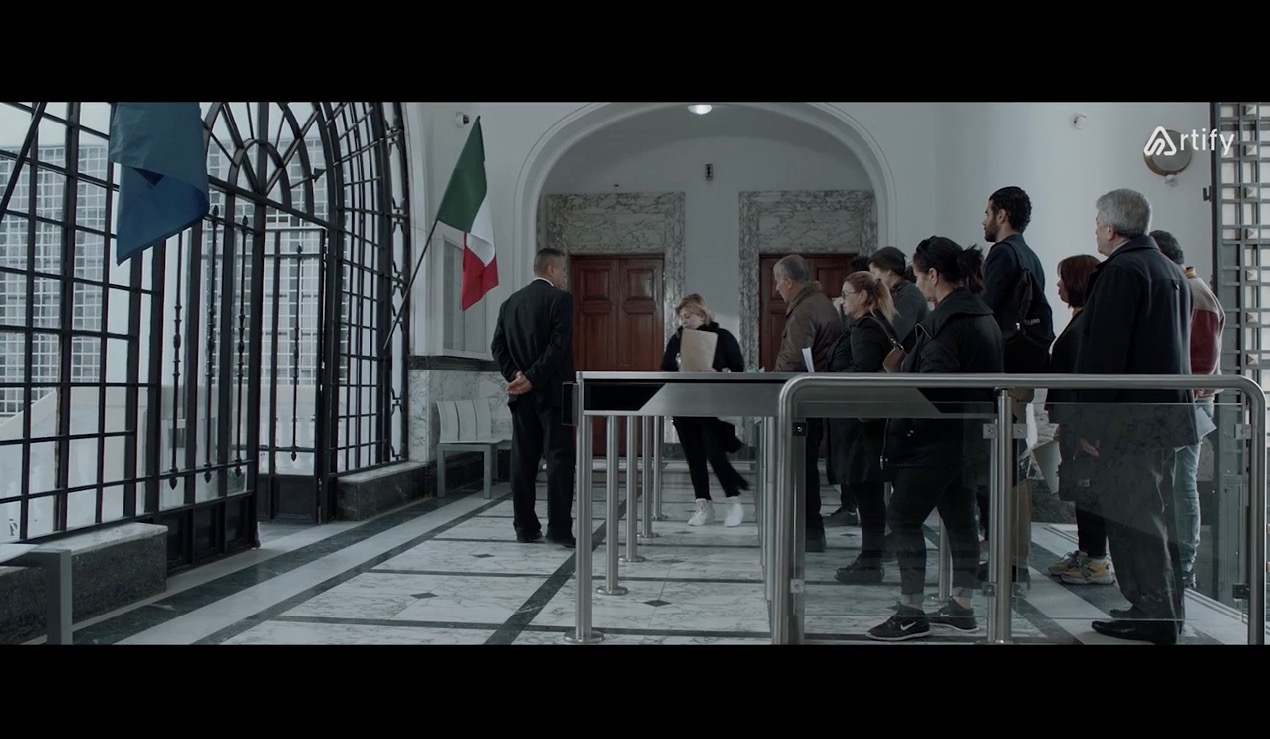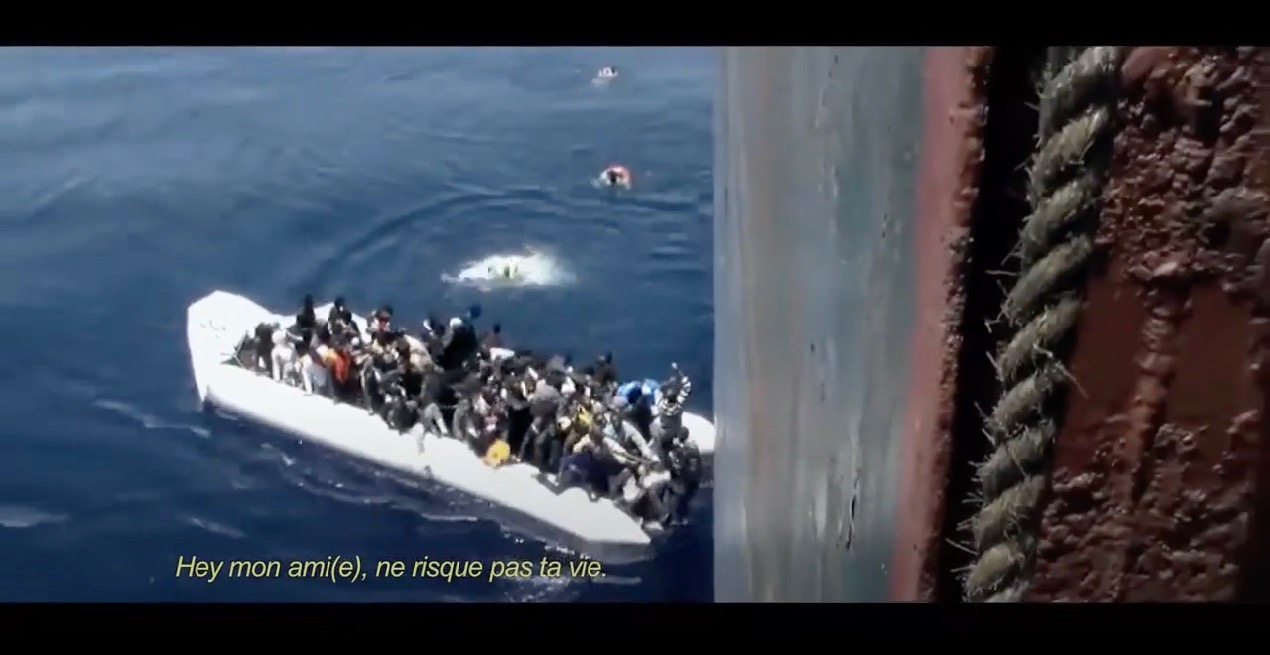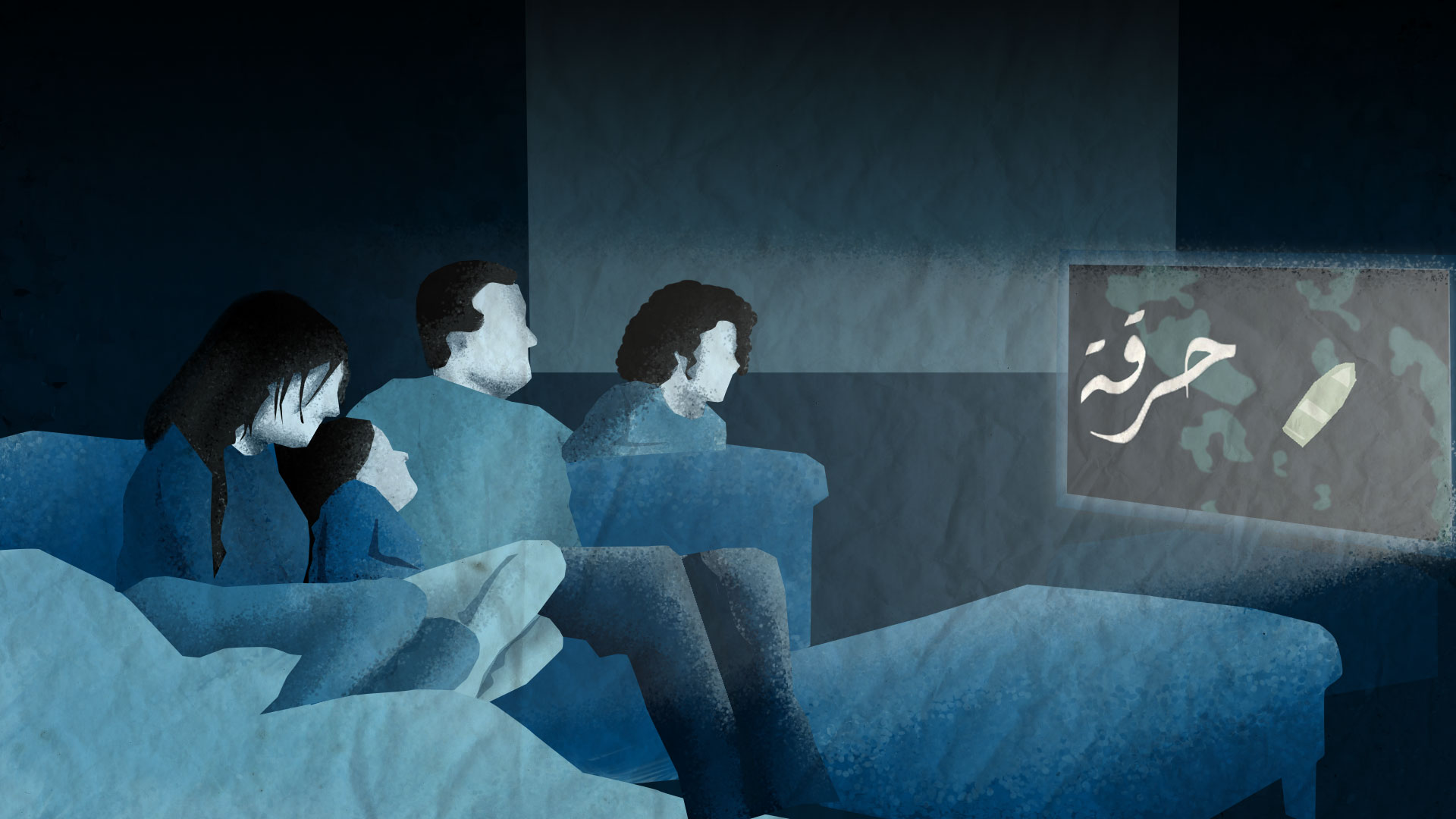While the series has received many positive reactions, others have expressed concerns about certain aspects. Imed Soltani, president of La Terre pour Tous (the association for Tunisians gone missing in the Mediterranean), acknowledges that "in the series, there are elements that are true" and that "the Mediterranean Sea has indeed become a migrant graveyard". However, he is disappointed that the series does not point fingers at "the major culprit: the European Union, which has closed its borders".
For example, the visa issue is only addressed once through the character of Hela when she attempts to obtain one for Italy, without success. The Tunisian agent in charge of her application tells her that some documents are missing. At no point are Italian officials featured.
In response to this critique, the director Lassaad Oueslati says: "We are not showing the details and minutia. There could potentially be other projects that talk about the difficulties we all face, including myself, to obtain a visa." Further justifying his decision, he adds: "We touched upon the topic through this symbolic sequence [...], but it was not the main theme." Oueslati continues: "Maybe [Imed Soltani] is right. But we tried to portray reality [...] with our own means."

Screenshot of the scene when Hela tries to get her visa.
"The project is not intended to criticise this or that party", Lassaad Oueslati continues, even though he then insists that in fact the Tunisian state, the European Union and "particularly Italy" were criticised "with great subtlety and intelligence”.
"This series is like a horror film that persuades migrants to not leave for Europe", says Imed Soltani.
While broadcasted on Wataniya 1, the opening and closing credits of the series were both preceded by five seconds of an advertisement promoting ‘Essih’, the "information and awareness" campaign that was recently launched by the IOM, a UN-affiliated intergovernmental organisation whose logo also appears in the end credits.
According to information obtained by Inkyfada from the national television, the IOM was not involved in the production of the series. The director explains that the national television and production company ‘Digipro’ contacted the UN (after filming), for a potential collaboration. The latter then referred them to the IOM. After many meetings it was established that "[the series] was more or less in line with our [Esshih] campaign", says Mehdi Limam, project coordinator at the intergovernmental organisation. "[The director] shared the same view as us on social issues in Tunisia, specifically irregular migration", Limam adds.
The IOM did not interfere in the content of the series either. "We could not and did not want to interfere in Lassaad Oueslati’s artistic work", says Mehdi Limam. According to Limam, "it remains a work of fiction, as imagined by the scriptwriter and the artist". However, he goes on to say that during the preparation meetings for the collaboration, "We [the IOM] offered a little guidance on the choice of terminology and some clichés that we wanted to erase from the director’s mind." Alice Sironi, protection officer at the IOM, admits that the organisation was “trying to convey the values of the IOM, such as the respect of migrants' rights”.
Even though the IOM did not interfere in the series, it nevertheless remains "a resource that will be used in the context of the campaign [Esshih], especially for our upcoming feature film." According to Mehdi Limam, the plan is to make a film with "the same footage" but "[in] a much more portable format for our campaign, allowing us to hold film screenings and debates."
Neither the national television nor the IOM wanted to disclose the amount paid for the commercials, but according to Sironi, "[the IOM] did not pay market price due to the humanitarian nature of their work."
DISCOURAGING IRREGULAR MIGRATION, DESPITE A LACK OF ACCESS REGULAR ALTERNATIVES
Officially, the Esshih campaign does not aim to "stop migration", but rather to "talk about the realities that await candidates who migrate through an irregular route". In preparation of this project, the IOM and the National Observatory of Migration (ONM), conducted a study to understand the profiles of potential so-called ‘irregular’ migrants, in order to target them through the campaign.
"When did the issue of irregular migration first arise? When Europe closed its borders with a visa that is impossible to obtain", says Imed Soltani. Through interviews with Tunisian nationals, the joint IOM-ONM study identifies the "impossibility of obtaining a visa" and "the lack of accessibility to regular migration routes" as contributing factors to irregular migration.
"The documents required to apply for a visa (proof of financial stability in the form of bank accounts holding significant funds, proof of personal ties to the country, proof of medical insurance coverage, etc.) are out of reach for most Tunisians. Additionally, the visa application fees are also high." The IOM-ONM Study, p.18
Several interviewees in the above-mentioned study "indicated that their applications were systematically rejected", deploring the fact that "fees were not refunded even when the visa was denied". Thus, "the widespread perception that visas are not fairly granted makes the whole process seem pointless and fraudulent".
Before attempting 'irregular' migration, those who wish to migrate often try their luck through legal channels. "Many of those who ultimately decided to travel irregularly had applied for visas, but their applications were denied for financial reasons", the report explains, citing the study conducted by REACH & Mercy Corps' 2018. The lack of regular migration routes therefore pushes many potential migrants towards harga*.
Additionally, many people favour this method because of
"acquired and/or increased debt resulting from regular and irregular migration". The above report mentions, for example, that
"people often borrowed large sums of money to establish their financial stability during the time of their visa interview, in order to buy documents that would enable them to obtain a visa, or by buying contracts".
"In the focus groups, participants mentioned people who had paid 30,000 TND (about 9,300 EUR) in exchange for work contracts, which could have enabled them to obtain a visa when presented at the visa interview."
According to the IOM, they "are well aware that there are, unfortunately, many limitations in accessing regular migration routes", confirms Alice Sironi. "It is something that the IOM is actively working on [through state lobbying”, but “in the end, it remains in the hands of these states to extend the routes for regular migration", Sironi continues.
In Italy, the obscure deportation process of Tunisian migrants
While waiting for the possibilities of regular migration to improve, the IOM's objective, according to Mehdi Limam, "is to reach those young people who think that the only solution to their problems is migration [...]. If they wish [to improve their] social or economic situation, there are other alternatives". "The goal is to support them so that they can try to develop their own personal projects", Alice Sironi adds.
According to data from the IOM survey on the motivations of "potential Tunisian migrants", 58.37% of respondents wished to "improve [their] living standards", whilst 55.67% "would like to be able to move and travel more freely" and 52.43% "just want to go abroad". Therefore, freedom of movement is on top of the economic and social reasons behind their decisions.
| RANK | MOTIVE | number of people | % |
|---|---|---|---|
| 1 | To improve my living standards | 216 | 58,37 |
| 2 | I would like to be able to move and travel more freely | 206 | 55,67 |
| 2 | I need money for my family | 206 | 55,67 |
| 3 | I just want to go abroad | 194 | 52,43 |
| 4 | Revenus insuffisants ici | 152 | 41,1 |
| The most frequently reported reasons, according to "Table 10: Potential Tunisian migrants interviewed according to reasons for migration", IOM-UN report. | |||
While the two IOM employees acknowledge that the Esshih campaign has the effect of deterring would-be irregular migrants, they reject any claims of inhibiting migration. "Yes, we dissuade them from irregular migration, because we know what's out there", Mehdi Limam admits, while claiming that "[the IOM's campaign does not] stop them.” "We don't dispute the fact that the options for regular migration routes are of little use to them. [They are] very, very limited. But, there are other ways to fulfil one’s dreams", he adds.
Limam deems the sources of information used by the migrants as "not always very reliable". According to him, "they only hear what they want to hear or are looking for [...]. Before making their decision, they talk to their peers; they don't intuitively watch the news or come to the IOM".
ESSHIH: ONE OF MANY EU-FUNDED CAMPAIGNS
Esshih is part of a larger project called ‘Awareness Raising and Information for Safety and Empowerment Campaign’ (ARISE). This 18-month project has a budget of €1,000,000, 90% of which is funded by the European Union. The project description proposes to "raise awareness of the risks associated with irregular migration amongst potential migrants."
In concrete terms, the Esshih campaign is also aimed at training "peer communicators" throughout the country, "in order to provide them with the skills and tools to organise awareness-raising activities". This is done in partnership with the Pontes association.
The IOM has previously implemented several other projects to raise awareness on irregular migration. These include
20 Young Persons, 20 Views on Migration (2014), which was financed by European funds, and the
Aware Migrants project that was funded by the Italian Ministry of the Interior between 2015 and 2019.
"Through the production of videos and testimonies of migrants arriving in Italy, revealing tragic stories of abuses and deaths, the Aware Migrants campaign aims at raising awareness among potential migrants on the risks they could face along the journey", reads the description of Aware Migrants.
As part of the campaign, the Senegalese artist Coumba Gawlo recorded the song titled 'Bul Sank sa Bakane bi' alongside ten other African artists. They sing: "Hey my friend, don't risk your life. Immigration is good if it's legal." The video clip, produced by the IOM, has been viewed nearly 70,000 times on Youtube, and several concerts were organised as part of an awareness-raising tour on irregular migration, again with the Organisation's support.

Screenshot from the video clip 'Bul Sank sa Bakane bi', posted on Coumba Gawlo's Youtube channel on 4 January 2018.
Indeed, these deterrence campaigns are not solely focused on Tunisia. As reported by Raphaël Krafft in Médiapart (Guinea), the IOM uses migrants who have failed to make it to Europe to "warn of the dangers of the journey".
In addition to the IOM's dissuasive discourse, some Western countries do not hesitate to warn migrants more directly through a range of confrontational messages. "Hungarians are hospitable, but the most severe sanctions are taken against those who try to enter Hungary illegally", "No way. You will not make Australia your home", or "No to illegal immigration. Don't come to Belgium", are three examples mentioned by Antoine Pécoud and Julia Van Dessel in their article in Le Monde Diplomatique.
THE IOM, SERVING EUROPEAN MIGRATION POLICIES
Created in 1959, the IOM has 173 member states. However, according to its 2020 budget, Western States* were responsible for more than 93% of the operational segment, allocating a total of €459,245,000 to the organisation, with the European Union providing €187,858,500 of the amount. These amounts neither take into account any potential project-specific donations, nor fundings of projects that the IOM is responsible for implementing.
The IOM became affiliated with the UN on September 19, 2016. "As a result, we get the impression that [the IOM] is a neutral organisation devoted to peace and its main beneficiaries, who are supposed to be the migrants", explains Sophie-Anne Bisiaux, a member of Migreurop. Yet, she argues that "it is an organisation entirely at the service of its backers, and in this case of externalisation policies, mainly of the European Union".
For example, the IOM is implementing a "voluntary return" programme, offering "orderly return and reintegration in a humane and dignified manner, to migrants who are unable to or unwilling to remain in the host country and wish to voluntarily return to their country of origin." Through this joint IOM-EU initiative, funded by the EU Emergency Trust Fund for Africa, 38,406 people have been "assisted" in returning to their North African countries of origin.
The humanitarian rhetoric behind the IOM's programme and work "enables externalisation and security policies to advance in complete disguise", explains Sophie-Anne Bisiaux. The IOM thus becomes Europe's ‘humanitarian guarantor’.
The IOM advocates "orderly" migration, i.e. "in accordance with the laws and regulations governing exiting the country of origin as well as movement, transit and entry into the host country."* However, promoting regular migration also sometimes means fighting irregular migration, as these deterrence campaigns do.
Alice Sironi and Mehdi Limam are in complete agreement on the fact that regular migration alternatives are currently limited and unequal. "We're trying to work on promoting more accessible routes for regular migration", Sironi explains. For her, it is necessary that the destination countries "carry out in-depth studies of their labour markets, recognise the widespread need for new workers” and “open up new migration routes accordingly".
However, this approach to migration only takes into account the economic interests of the destination countries, and is thus called into question. "When we look at how international migration is seen, it is a mobility that serves the economies of the global north, that fills their labour markets. This implies either the migration of ultra-qualified people (to whom a right of residence may be given), or under-qualified migration in order to fill job positions that are shunned by nationals of the destination countries. However, in these latter cases, the migration does not offer any right of residence, it is precarious, and generally seasonal", Sophie-Anne Bisiaux believes.
The option of temporary contracts and seasonal work linked to the specific needs of 'employers' is communicated through the official channels of the Tunisian authorities. The website of the ‘Tunisian Ministry of Vocational Training and Employment’ states that "French employers can call upon Tunisian workers to meet their needs, provided that there is no qualified labour available on the [former's] national territory". However, the Tunisian workers who wish to leave are immediately cautioned: to be able to migrate, it is imperative that they commit to "returning to Tunisia at the end of their contract".




